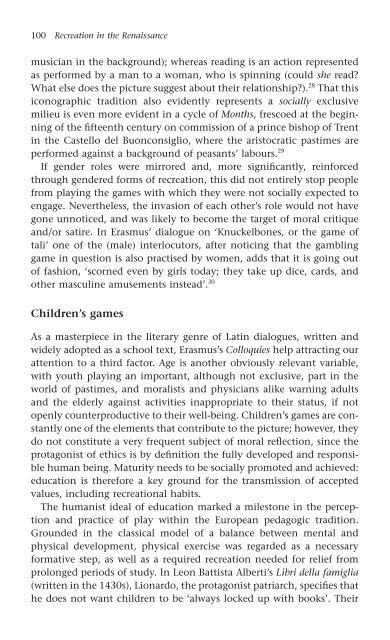Recreation in the Renaissance
Recreation in the Renaissance
Recreation in the Renaissance
- No tags were found...
You also want an ePaper? Increase the reach of your titles
YUMPU automatically turns print PDFs into web optimized ePapers that Google loves.
100 <strong>Recreation</strong> <strong>in</strong> <strong>the</strong> <strong>Renaissance</strong><br />
musician <strong>in</strong> <strong>the</strong> background); whereas read<strong>in</strong>g is an action represented<br />
as performed by a man to a woman, who is sp<strong>in</strong>n<strong>in</strong>g (could she read<br />
What else does <strong>the</strong> picture suggest about <strong>the</strong>ir relationship). 28 That this<br />
iconographic tradition also evidently represents a socially exclusive<br />
milieu is even more evident <strong>in</strong> a cycle of Months, frescoed at <strong>the</strong> beg<strong>in</strong>n<strong>in</strong>g<br />
of <strong>the</strong> fifteenth century on commission of a pr<strong>in</strong>ce bishop of Trent<br />
<strong>in</strong> <strong>the</strong> Castello del Buonconsiglio, where <strong>the</strong> aristocratic pastimes are<br />
performed aga<strong>in</strong>st a background of peasants’ labours. 29<br />
If gender roles were mirrored and, more significantly, re<strong>in</strong>forced<br />
through gendered forms of recreation, this did not entirely stop people<br />
from play<strong>in</strong>g <strong>the</strong> games with which <strong>the</strong>y were not socially expected to<br />
engage. Never<strong>the</strong>less, <strong>the</strong> <strong>in</strong>vasion of each o<strong>the</strong>r’s role would not have<br />
gone unnoticed, and was likely to become <strong>the</strong> target of moral critique<br />
and/or satire. In Erasmus’ dialogue on ‘Knuckelbones, or <strong>the</strong> game of<br />
tali’ one of <strong>the</strong> (male) <strong>in</strong>terlocutors, after notic<strong>in</strong>g that <strong>the</strong> gambl<strong>in</strong>g<br />
game <strong>in</strong> question is also practised by women, adds that it is go<strong>in</strong>g out<br />
of fashion, ‘scorned even by girls today; <strong>the</strong>y take up dice, cards, and<br />
o<strong>the</strong>r mascul<strong>in</strong>e amusements <strong>in</strong>stead’. 30<br />
Children’s games<br />
As a masterpiece <strong>in</strong> <strong>the</strong> literary genre of Lat<strong>in</strong> dialogues, written and<br />
widely adopted as a school text, Erasmus’s Colloquies help attract<strong>in</strong>g our<br />
attention to a third factor. Age is ano<strong>the</strong>r obviously relevant variable,<br />
with youth play<strong>in</strong>g an important, although not exclusive, part <strong>in</strong> <strong>the</strong><br />
world of pastimes, and moralists and physicians alike warn<strong>in</strong>g adults<br />
and <strong>the</strong> elderly aga<strong>in</strong>st activities <strong>in</strong>appropriate to <strong>the</strong>ir status, if not<br />
openly counterproductive to <strong>the</strong>ir well-be<strong>in</strong>g. Children’s games are constantly<br />
one of <strong>the</strong> elements that contribute to <strong>the</strong> picture; however, <strong>the</strong>y<br />
do not constitute a very frequent subject of moral reflection, s<strong>in</strong>ce <strong>the</strong><br />
protagonist of ethics is by def<strong>in</strong>ition <strong>the</strong> fully developed and responsible<br />
human be<strong>in</strong>g. Maturity needs to be socially promoted and achieved:<br />
education is <strong>the</strong>refore a key ground for <strong>the</strong> transmission of accepted<br />
values, <strong>in</strong>clud<strong>in</strong>g recreational habits.<br />
The humanist ideal of education marked a milestone <strong>in</strong> <strong>the</strong> perception<br />
and practice of play with<strong>in</strong> <strong>the</strong> European pedagogic tradition.<br />
Grounded <strong>in</strong> <strong>the</strong> classical model of a balance between mental and<br />
physical development, physical exercise was regarded as a necessary<br />
formative step, as well as a required recreation needed for relief from<br />
prolonged periods of study. In Leon Battista Alberti’s Libri della famiglia<br />
(written <strong>in</strong> <strong>the</strong> 1430s), Lionardo, <strong>the</strong> protagonist patriarch, specifies that<br />
he does not want children to be ‘always locked up with books’. Their










